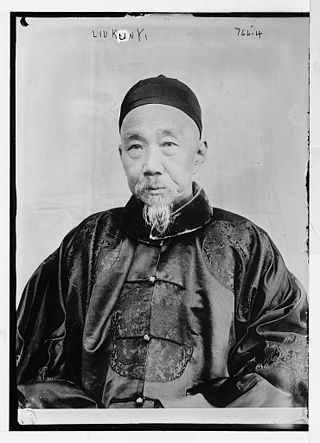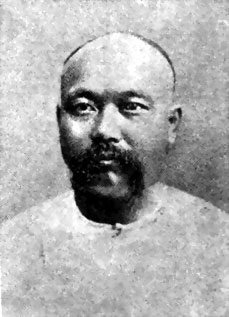
Zhang Zhidong was a Chinese politician who lived during the late Qing dynasty. Along with Zeng Guofan, Li Hongzhang and Zuo Zongtang, Zhang Zhidong was one of the four most famous officials of the late Qing dynasty. Known for advocating controlled reform and modernization of Chinese troops, he served as the governor of Shanxi Province and viceroy of Huguang, Liangguang and Liangjiang, and also as a member of the Grand Council. He took a leading role in the abolition of the Imperial examination system in 1905. The Red Guards destroyed his tomb in 1966 during the Cultural Revolution. His remains were rediscovered in 2007 and reburied.

Shen Baozhen (1820–1879), formerly romanized Shen Pao-chen, was an official during the Qing dynasty.

Liu Kunyi was a Chinese official who came to prominence during the government suppression of the Taiping Rebellion and was active in the following Self-Strengthening Movement in the second half of the nineteenth century, the late Qing dynasty. He was native of Xinning County, Hunan.
Imperial Commissioner was a high-ranking government official or military general commissioned by the emperor of China during the late Ming (1368–1644) and Qing (1636–1912) dynasties. His power was just below that of the emperor, such that he could command viceroys and provincial governors by imperial edict.

Liu Buchan was a naval officer of the Beiyang Fleet, the most prominent of China's naval units in the late Qing Dynasty. He is best remembered for his actions as commander of the fleet flagship, the Dingyuan, during the First Sino-Japanese War. After his death and the ship being destroyed at the end of the war, he was raised to national hero status in modern China. At his death, Liu was commander of the fleet flagship, with the rank Admiral of the Right, and reserve Admiral of the Fleet.

The Mutual Defense Pact of the Southeastern Provinces was an agreement reached in the summer of 1900 during the Boxer Rebellion by Qing dynasty governors of the provinces in southern, eastern and central China when the Eight-Nation Alliance invaded northern China. The governors, including Li Hongzhang, Xu Yingkui, Liu Kunyi, Zhang Zhidong and Yuan Shikai, refused to carry out the imperial decree promulgated by the Qing imperial court to declare war on 11 foreign states, with the aim of preserving peace in their own provinces.
Events in the year 1900 in China.
Events in the year 1884 in China.
Events in the year 1885 in China.
Events from the year 1899 in China.
Events from the year 1898 in China (戊戌).
Events from the year 1883 in China.
A list of historical events that took place in China in the year 1880.
Events from the year 1897 in China.
Events from the year 1876 in China.
Events from the year 1877 in China.
Events from the year 1878 in China.
The following lists events that happened during 1881 in China.
Events from the year 1882 in China.
Events in the year 1886 in China.





